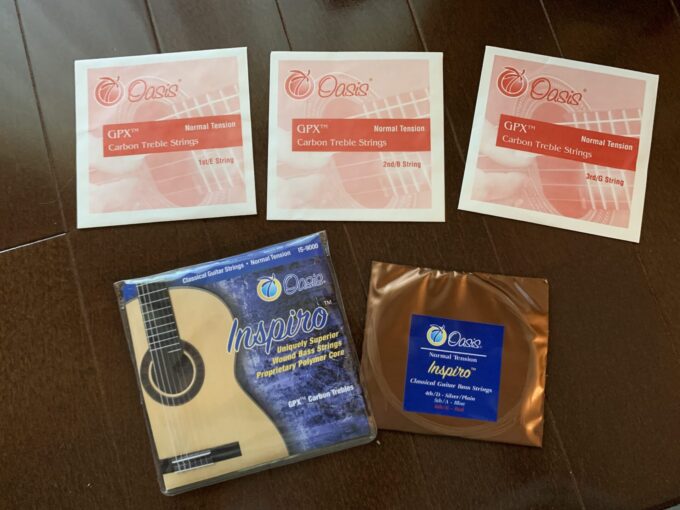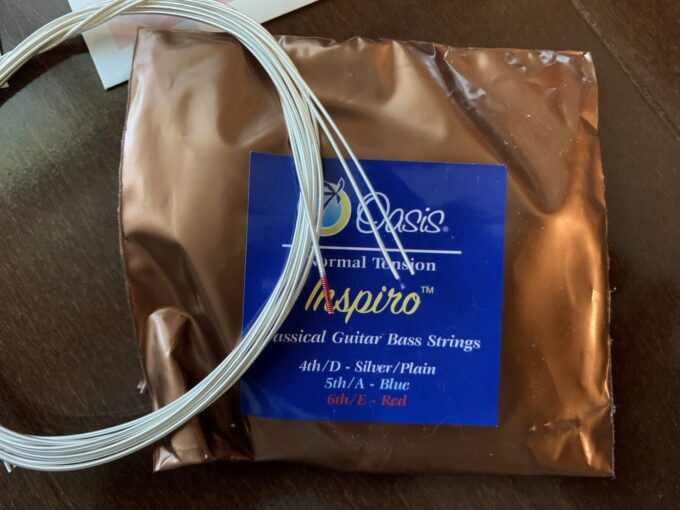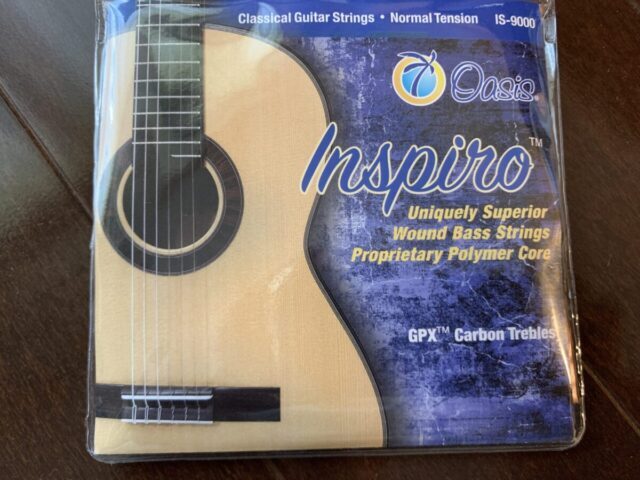In the past, classical guitar strings were made of gut (sheep gut), but that has changed to nylon, and recently many new materials have been introduced to the market. Oasis’ Inspiro is one of these new material strings. I had a chance to try it out.

The following article summarizes the string reviews/thoughts/information articles on this blog:.
- Proprietary non-nylon material used for the bass string core wire
- GPX+ Carbon is used for treble strings
- Easy to distinguish bass strings.
- Clear and distinct bass string sound
- Treble strings that sound good without squeaking
- (Postscript): Durability is so good.
- Recommended for those who want a modern guitar sound.
Proprietary non-nylon material used for the bass string core wire
This Oasis Inspiro is unique in that it uses a proprietary non-nylon material for the bass string core wire.
Normal classical guitar strings are made of a large bundle of thin nylon as the core wire, which is then wrapped with silver-plated copper wire.
However, by daring to use a new non-nylon material for the core wire,it gets the following points:
- Clear sound
- Powerful projection
- Excellent sustain
- High pitch stability
They also have high durability.
In the same way, there are Hanabach’s Exclusive, D’Addario’s Pro Arte Dynacore, and Savarez’ Cantiga as the strings which have ingenuity in the material of the core wire, and it may be said that the use of new materials other than nylon is a new trend among string manufacturers.
GPX+ Carbon is used for treble strings
The treble strings that can be combined with these bass strings are called GPX+ Carbon strings from Oasis.
The strings are also unusual, withdifferent fluorocarbon materials used for the first and second&third strings.
The first string is made of a material that solves the problem of strings tearing, which is common with fluorocarbon.
On the other hand, the 2nd and 3rd strings are said to be made of materials to make the most of each tone.
There is no difference in appearance, it looks like a normal classical guitar string.
Also, treble strings made with fluorocarbon tend to have a harsh sound, but GPX+ Carbon claims to have solved that problem as well.
Easy to distinguish bass strings.
The inside of the package looks like this.

The first, second, and third strings are contained individually in a non-airtight paper envelope, while the bass strings are grouped together in an airtight package.
The problem with this method is that it’s hard to tell which string is which bass string, but in the case of Oasis, they’ve made it easier to tell by coloring the ends of the strings.

The 6th string is red, the 5th string is blue, the 4th string is uncolored.
This is the same method as the company’s GPX Claro.
It looks like a normal bass string and a normal treble string, so there is no sense of discomfort.
Clear and distinct bass string sound
I put it up immediately and tried to make a sound.
As for the bass strings, which are the main selling point, they sound modernanyway.
The sound is loud, far reaching, and clear. The sustain also feels long, as Oasis says.
It’s almost like an “acoustic guitar sound” in a good way.
The 5th string sounds especially good.
The sound of the 4th string is a little too harsh, although it may be because it is still freshly strung. This may settle down with use.
The stability of the string was definitely good, and I was able to use it normally the day after I strung it.
Treble strings that sound good without squeaking
GPX+ Carbon treble strings certainly don’t kink like regular carbon strings do.
Or perhaps carbon strings are no longer squeaky because many companies have recently released “squeak-free carbon strings”.
Among them, GPX+ Carbon seems to have a sound more like nylon.
The tone changes greatly when you change the place to play, and it can be said that these carbon strings are easy to handle.
However,the nylon strings may be more colorful in terms of sound. Especially, when I play the high fret of the first string, the sound flies forward firmly, but I feel that I want a little more glossy sound.
One thing that bothered me a bit was that the first string was slippery. When I put it on the bridge with a single winding, it slipped and came off, and when I put a double winding on it, it stabilized, but it’s the slipperiest string I’ve ever played.
(Postscript): Durability is so good.
This string has a very long life.
In my case, normal strings lasted 2 weeks, and the bass strings dented after 3 weeks on the ones that are supposed to last longer, but the Oasis Inspiro lasted 4-5 weeks.
It seems to be economical to use.
Recommended for those who want a modern guitar sound.
The Oasis Inspiro is one of the most modern sounding strings I’ve ever used.
It has the characteristics of loud sound, responsive, and no blur.
If you are looking for this kind of sound, this is the string for you.
On the other hand, if you’re looking for a more traditional or colorful sound, there may be other options.
At the moment, it is difficult to get them in Japan, but they are good strings and you should try them.






